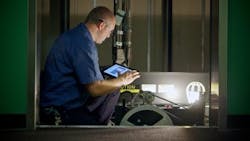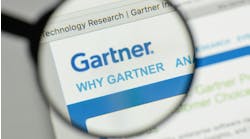Elevators are a great example of IIoT in the here and now. Modern elevator technology is now more than a century old. Elevators are generally very reliable. But for elevators to deliver the highest performance and, in particular, for them to do so cost-effectively and efficiently over the long-term, IIoT can deliver many benefits. Consider that as a complete system, no amount of testing can fully predict the results of continuous operations over many years, with innumerable variations in loads and other conditions.
Technicians access predictive data from elevators on mobile devices, including error codes, their probable causes and likely fixes.
Photo Credit: Microsoft
Thus, the ability that ThyssenKrupp now has to instrument their installations and to gather and analyze the data means that two things are now possible – preemptive maintenance, and deep engineering data for product improvement.
On the maintenance front, for example, according to an article posted on a Microsoft site, The Fire Hose, technicians can actually access predictive data from elevators on their own mobile devices. That data also includes not only familiar error codes but an analytics-driven “best guess” about probable causes and potential fixes. Techs can even perform some diagnostic routines remotely, taking an elevator out of service and running it through its paces from miles away.
Machine learning based on Microsoft Azure Machine Learning (Azure ML) ensures that the process will continue to improve over time.
ThyssenKrupp is no stranger to innovation and was recently recognized by the Massachusetts Institute of Technology (MIT) Technology Review, as one the 50 Smartest Companies in 2015 – and the only industrial manufacturing company so named. MIT Technology Review praised the company’s innovative technology, in particular, MULTI, a next-generation cable-free elevator that features multiple cabs in single shaft that can also be configured to travel horizontally. According to the company, MULTI applies the linear motor technology of the magnetic levitation train, Transrapid, to the elevator industry.
The new design can incorporate various self-propelled elevator cabins per shaft running in a loop, similar to a metro system. This increases the shaft transport capacity by up to 50 percent, making it possible to reduce the elevator footprint in buildings by as much as 50 percent. That’s of huge importance because as skyscrapers increase in height they usually must devote an ever increasing portion of potential floor space to people moving, which can threaten their economic viability at some point. Clearly, MULTI is a technology that requires much more intelligence than simply hauling a box up and down a shaft! But even more conventional designs can benefit from more data.
For Microsoft, IoT and its industrial aspects, are of obvious interest. Microsoft is not always first in a given technical area, but when it arrives it has staying power. For example, Microsoft has demonstrated the use of real-time analytics and visualization through Azure Machine Learning and Power BI, to support the kind of predictive analytics ThyssenKrupp could use to determine equipment failure, alert maintenance engineers, or even push data into appropriate CRM systems through custom connectors.
Microsoft’s Kevin Miller will be providing the opening keynote at the Smart Industry Conference in October. Rory Smith, Director of Strategic Development Americas at ThyssenKrupp, will join Kevin for an interactive plenary panel discussion following the keynotes.
- Learn more about Kevin Miller, Principal Program Manager for Azure IoT at Microsoft
- Learn more about Rory Smith, Director of Strategic Development Americas at ThyssenKrupp Elevator
- See the full Smart Industry 2015 Agenda
- Register for the Conference
Alan R. Earls is a Boston-based writer focused on technology, business, and manufacturing — a field where he spent the earliest part of his career. He has written for publications and websites as diverse as The Boston Globe, Computerworld and Modern Infrastructure as well as Industry, The Manufacturer, and Today's Machining World.





